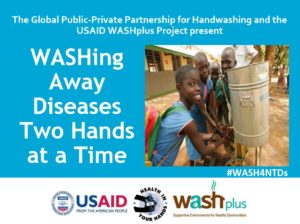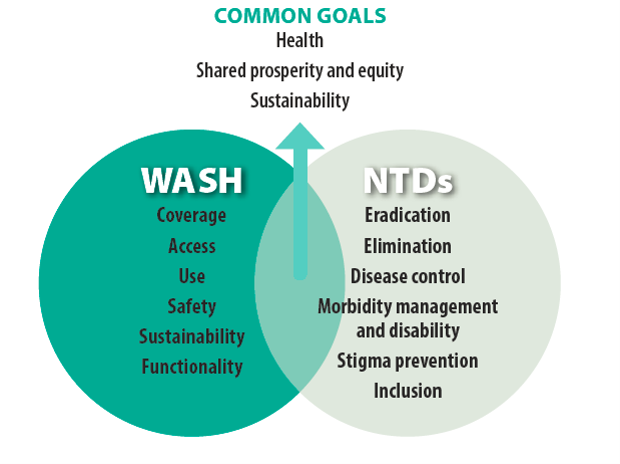Webinar Summary: WASHing Away Diseases Two Hands at a Time
Published: February 18, 2016 / Published by Global Handwashing Partnership & USAID WASHPlus

This webinar summary explores the relationship between WASH and the prevalence of neglected tropical diseases.
When we think of the health impact of water, sanitation, and hygiene (WASH) interventions, we oftentimes think of reduced rates of mortality and morbidity from diseases such as diarrhea and pneumonia, a decreased risk of infections in healthcare facilities, and the potential for improved nutritional outcomes. However, we should not overlook the impact of WASH on reducing the prevalence of some neglected tropical diseases (NTD).
That was the topic of the GHP/USAID WASHplus co-hosted “WASHing Away Diseases Two Hands at a Time” webinar, where experts from USAID, the World Health Organization (WHO), Sightsavers, WaterAid, the USAID WASHplus Project, and the International Coalition for Trachoma Control came together and discussed the mutual relationship between NTD control and WASH promotion.

Source: WHO, 2015
Kicking off the conversation was Merri Weinger of USAID and Renuka Bery of the USAID WASHplus Project, who gave an overview of four NTDs—soil-transmitted helminths, schistosomiasis, trachoma, and lymphatic filariasis—that WASH can help control. While the specific nuances of controlling each disease vary, each of the four can be controlled through at least one aspect of WASH improvement. Additionally, Ms. Bery highlighted the three common goals associated with NTD and WASH programs—an improvement in health, sustainability, and a shared prosperity and equity—that can serve as a common ground for collaboration.
To expand upon the previous point, the third speaker, Sophie Boisson of the WHO, touched upon increasing global recognition of the need to not only improve awareness about the importance of WASH and NTD programs, but also to combine the interventions and approaches of these two sectors. As she mentioned, one of the five key interventions used to combat NTDs calls for the provision of safe drinking water, basic sanitation, and hygiene services, highlighting the value of integrating WASH and NTD programs.
To drive this point home even further, 3 panelists from a range of organizations spoke about their experiences applying WASH interventions to achieve NTD objectives. Yael Velleman, of WaterAid, gave the first example by demonstrating how the Facial Cleanliness and Environmental Improvement (F&E) Planning Tool can be used as part of an integrated surgery, antibiotics, facial cleanliness, and environmental improvement (SAFE) program to achieve trachoma elimination by 2020. Here, Ms. Velleman spoke about the four key steps for this program’s success: partnerships, evidence, programming, and learning.
Geordie Woods of Sightsavers highlighted the importance of the continued analysis and research within the F&E Toolkit to improve program design and implementation, doing so by mentioning the work conducted in Chad, Ethiopia, and Tanzania.
To conclude the session, Edouard Tianhoun of the USAID WASHplus project spoke of his experience working on the ground in Burkina Faso. While Mr. Tianhoun addressed many of the points made by the earlier speakers, of particular interest is his mention of the methods used to effect behavior change, specifically highlighting the use of radio and other media at the local level.
Integration is important for tackling big challenges in global health. We hope that those who attended this webinar now have a better understanding of the both the “why” and the “how” of WASH/NTD integration.
A recording of the webinar is available here. The presentations are available here.
- Resource Attachments:
- https://globalhandwashing.org/wp-content/uploads/2017/12/PPPHW-WASHplus-Webinar-presentation-WASHing-Away-Diseases-Two-Hands-at-a-Time.pdf (pdf)
TAGS: Event RecordingBriefing Paper IntegrationHandwashing Promotion ImplementersPolicy MakersGeneral PublicEducators English 2016